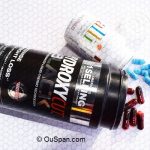
Protein supplements gained a lot of popularity among fitness and healthy lifestyle enthusiasts. There is a good reason for it, convenience. It is much easier and faster to mix some powder with water or milk and drink it on the go. This way it is possible to keep your protein intake up without sacrificing time for cooking. Also, protein powder is cheaper than some protein sources. However, keep in mind that there might be some protein powder side effects.
One cause of it is there is no long term research on the consumption of protein powders or similar supplements. Another cause is a huge variety of supplements and supplement manufacturers. No protein powder and protein powder manufacturers are created equal. What is said on the box might be different from that is actually inside since FDA doesn’t confirm claims which are made by a manufacturer.
Also, you might have issues with some types of protein because of the ingridients it is based on. For example, if you are lactose intolerant, you might have issues with whey protein because it contains lactose. Here is the list of side effects which may result from a protein consumption:
Protein Powder Side Effects
| Can Cause Acne
Protein supplements can cause acne . Whey protein, in particular, has a tendency to increase production of insulin-like growth factor, or IGF-1 in short. This can increase a sebum production by the body and as a result, cause acne (Simonart T., 2012).
| Heavy Metal and Toxin Poisoning
Protein supplements can contain heavy metals and lead to heavy metal poisoning – a number of protein powders were found to contain heavy metals like lead and cadmium.
Whenever it is a result of poor manufacturing practices or low quality of the raw material used in production, a result on the body is the same. Stomach pain, vomiting, and diarrhea are common symptoms of heavy metal poisoning. Also, the accumulation of heavy metals in the body significantly increases the risk of cancer.
A toxic chemical Bisphenol A (BPA) that leads to cancerous tumors, birth defects, and developmental disorders has been found in some protein supplements.
A study from the Clean Label Project has tested the best selling 134 protein powder products from 52 different brands. Generally, lead was found in 70% of products, cadmium in 74 %, and BPA in 55%. The overall study conclusion:
- Protein powders with egg is cleaner than plant based products
- Lead was found in 75% plant-based protein powder
- Organic supplement had 40% less BPA than non-organic
- However, it was found that on average certified "Organic" had twice more heavy metal including lead, arsenic, and cadmium than non-organic.
Check the website www.cleanlabelproject.org for the top best and the top worst protein powders.
| Can Cause Liver Damage
Protein supplements can cause liver damage – if a bulk of your diet consists of protein-rich foods and protein supplements, it puts a great deal of pressure on your liver. You need to balance your protein intake with fats and carbohydrates.
Some weight loss recommendations suggest a keto diet as the best way to lose fat fast. Keto diet is basically zero carb diet with fat and protein as the only nutrients. It makes the body switch to fat burning as main fuel instead of carbohydrates and it works pretty well for some people.
However, it is important to remember that the bulk of a keto diet is still fats, not protein. There are various recommendations, but usually, around 2/3 of calories are supposed to be from fat and only third from protein. If you will flip this ratio and start consuming mostly protein from supplements or even real foods, your chance of liver damage increases significantly.
When whey protein is used without exercising, liver damage may occur due to liver inflamation (Gürgen S.G. et al., 2015).
| Can Cause Kidney Issues
Protein supplements can cause kidney issues – as a by-product of a body utilizing protein, ammonia is produced. Ammonia is then removed from the body through the kidney. Excessive amounts of protein in a diet lead to excessive ammonia production which will put additional pressure on a liver in order to discharge this protein metabolism by-product. As a result, the risk of developing kidney stones and the risk of a variety of kidney diseases increases (William F Martin et al., 2005).
| Can be a Reason of Hormonal Disruptions
Protein supplements can cause hormonal disruptions – soy protein can cause a significant increase in estrogen in both men and women and as a result, throw off the body’s hormonal balance.
Soy contains phytoestrogen which is basically as good as an actual estrogen when consumed. When an excessive amount of hormones are introduced to the body from the outside, it can disrupt a person’s hormonal balance and cause a lot of issues. Some of the possible problems may include gynecomastia in men, irregular menstrual periods in women, mood swings, decreased sex drive and a variety of other negative symptoms.
| Can Upset Stomach
Protein supplements can affect gut flora and upset stomach – whey, casein and similar types of protein supplements generally contain lactose and lactoferrin. These compounds can cause stomach issues in some people and in some instances even throw gut microbiota off balance.
In the ideal situation in the ideal world, you should fulfill all of your protein needs from a variety of real nutrient dense foods like meat, nuts, legumes, eggs, milk, fish, etcetera.
Here we talk not only about protein intake on its own, but about balanced diet since you are getting not only good protein but a collection of vitamins, nutrients, and minerals you must have in order for your body to function properly.
However, we don’t always live in the ideal world, so if a need for you to take protein supplement arises, make sure you get a quality powder from a reputable manufacturer. Do your due diligence when you consider what you put in your body, don’t just buy whatever is on sale. Your body will thank you with superior performance and optimum health.
Related
 Protein Intake Considerations – How Much Do We Need?
Protein Intake Considerations – How Much Do We Need?
Protein is often defined as a building block for muscles. This is true, however...
1. The hidden dangers of protein powders. Harvard Health Publishing. Harward Medical School. 2018.
2. Simonart T. Acne and whey protein supplementation among bodybuilders. NCBI. 2012.
3. Gürgen S.G. et al.. Usage of whey protein may cause liver damage via inflammatory and apoptotic responses.. NCBI. 2015.
4. William F Martin et al.. Dietary protein intake and renal function. NCBU. 2005.




